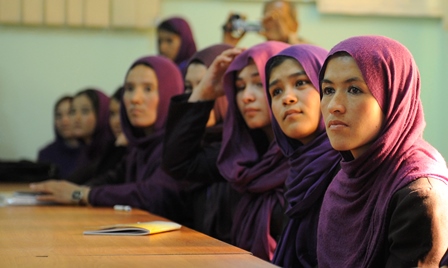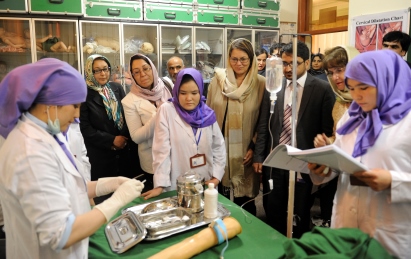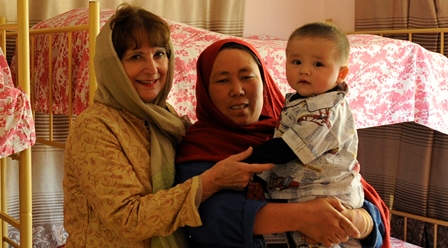Canada's support of 5.2 Million CAD Dollars will establish 49 new Family Health Houses which will provide ante-natal, delivery and post-natal care, birth spacing and immunization services 24 hours and seven days a week in the most remote areas of Daikundi.
Kabul, 26th April 2014- The Ministry of Public Health, the Government of Canada and UNFPA, the United Nations Population Fund, presented today the second phase of the project "Improving Reproductive Health and Promoting Women's Empowerment in Daikundi", which aims to provide access to maternal, newborn and reproductive health services to all remote areas of this province by 2015.
The project's main component is the Family Health House, a life-saving facility managed by a community trained midwife who provides essential maternal, newborn and child health services to those living in the most remote and underserved areas of Daikundi. 
Canada's support of 5.2 Million CAD Dollars to this project will establish 49 new Family Health Houses which will provide ante-natal, delivery and post-natal care, birth spacing and immunization services 24 hours seven days a week. Each Family Health House will be equipped to provide health care services for a maximum of 4,000 people.
"Canada is proud to be contributing to the Government of Afghanistan's efforts to improve the health of women, newborns and children. Through the establishment of 49 Family Health Houses in Daykundi, Canada is supporting a province that is often cited as one of the most underserved areas in the country," said Deborah Lyons, the Canadian Ambassador to Afghanistan. "These Family Health Houses strengthen both community and provincial health services by expanding the availability of quality maternal and newborn health care. They also are helping to address the real need for skilled birth attendants. The trained midwives from these communities can serve as role models for young girls and empower them to continue their studies and to choose midwifery as a career."
Each Family Health House is managed by a trained midwife chosen from the community she serves. As part of the project, the community, families, shuras and elders select students in their villages to be part of the Community Midwifery Education programme. Once selected, the future midwife enrols in a two-year education programme complemented by a two month period where she learns how to manage a Family Health House. 
"For many years it was not possible to encourage female health workers to work in Daikundi. I am pleased that we finally have a solution to this problem since the midwives staffing the Family Health Houses are selected from the communities they serve. This way their retention after training and deployment is also ensured. These midwives not only return to their communities with life-saving skills sets, but they also return with a sense of empowerment and status," said Dr. Najia Tariq, Deputy Minister of Public Health, during the ceremony.
Lack of female-staffed medical facilities and lack of an accompanying male family member escort (maharam) usually are the most common reasons limiting health care access for women. In 2010 there was only one female doctor in the entire province of Daikundi working in the provincial hospital, most of the Basic Package of Health Services facilities were under-staffed, and the need for female health workers and skilled birth attendants was especially grave.
Since 2009, the Ministry of Public Health and UNFPA have been working to improve the health and wellbeing of communities living in the underserved areas of this province. Currently, 23 Family Health Houses are functional in Daikundi. Thanks to the support of Canada Government, by 2015 the total number of Family Health Houses will be 58, covering 100 per cent of the total population living in the most remote areas of Daikundi, 30 per cent of the population of the province.

"In addition to their work of ensuring safe deliveries and providing essential newborn care, midwives provide birth spacing services and health information," said Dr Annette Sachs Robertson, UNFPA Representative. "Since the communities themselves construct the Family Health Houses with the support from the health shuras and community health workers, this model establishes a partnership with the community, facilitating its sustainability."
The community midwife works with the community and family decision makers to ensure that women receive preventive care services. They are supported by two community health worker volunteers; one male and one female. They meet the family members separately and sensitize them about the importance of different health issues, including family planning.
Family Health Houses are also supported by Mobile Health Teams once or twice a month. These teams visit the Family Health Houses and give technical and managerial support to the community midwife. They also vaccinate and provide primary health care.
Since 2009, the Ministry of Public Health with UNFPA support has established 82 Family Health Houses and nine Mobile Health Teams in the provinces of Faryab, Daikundi and Bamyan. By 2016 nine Family Health Houses will be functional in the province of Herat with the support of the Embassy of Italy.


